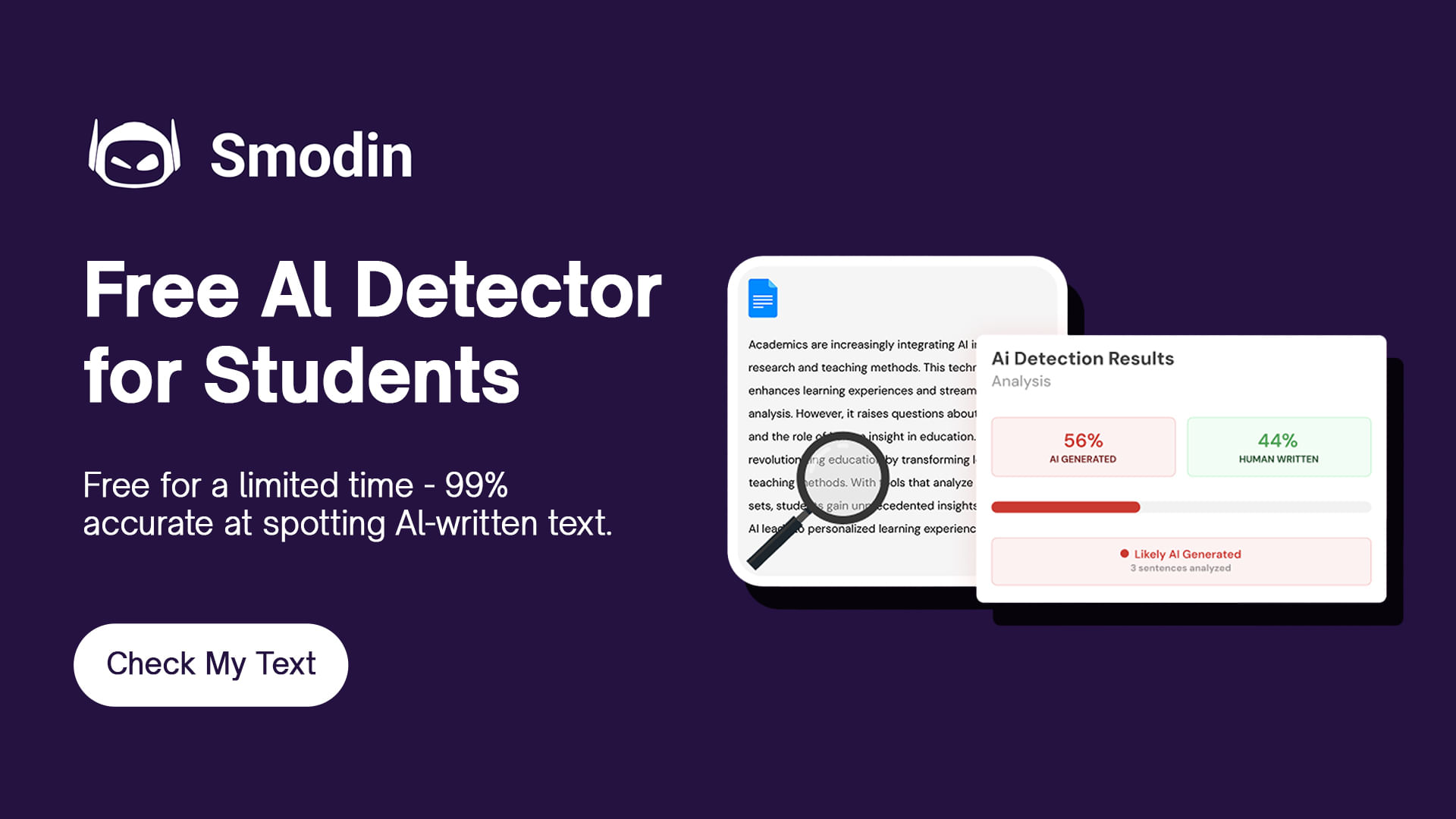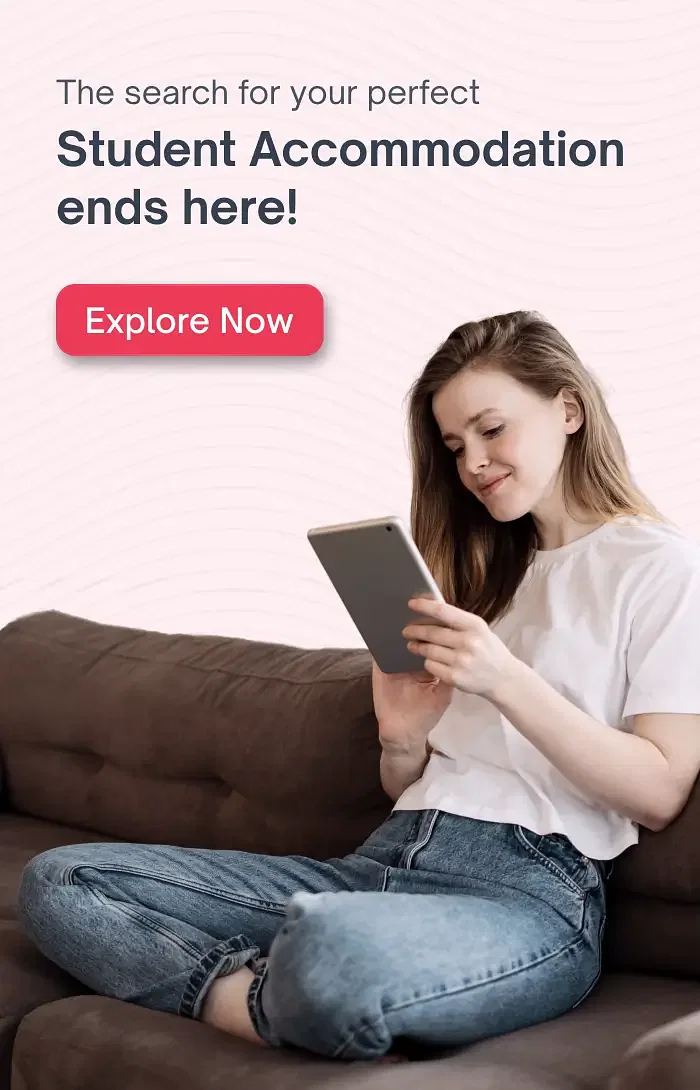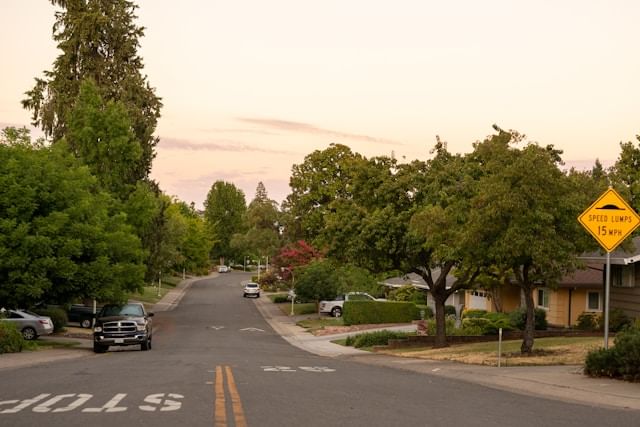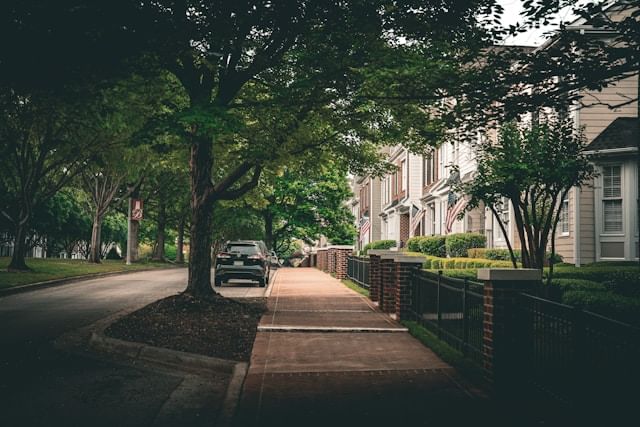When enrolling in university, you start making variety of decisions, such as where to study, when to begin the classes, which courses to pursue, and which learning method is most suitable. However, there is one decision that is often overlooked: How to choose student accommodation?
Finding your home away from home is essential for ensuring you get the best university experience. It helps you in your studies, social life, stress, and finances. So, to ensure you find the perfect student accommodation, here's a list of how to choose student accommodation.
Types of Student Accommodation
Having countless options to pick from can certainly be overwhelming. Why waste precious time scrolling through student accommodation options that aren’t a good fit? There is a wide range of accommodation for students in the year 2023-24. Each type of accommodation has its advantages and disadvantages, but all are viable options if they have the necessary certifications. This will ensure that students are provided with the highest quality of accommodation for the duration of their stay. Let’s take a look at the most common types of accommodation for students.
1. Private Rented Houses
These are the largest and most popular options among students. Private residences are typically owned and operated by landlords as privately rented properties. Private residences provide more flexibility in terms of dates and also allow you to select your location and room type more easily. Private residences are not student-only, so you may find yourself sharing a house with a mix of both students and professionals.
2. On-Campus Accommodations
If you choose to stay on campus, you'll be able to meet a lot of people, and you'll be closer to your college. Although you won't have as much freedom to pick your room, this is a popular choice for first-year students. On-campus accommodation is usually reserved for one academic year.
3. Purpose-built Student Accommodation (PBSA)
PBSAs are high-rise student accommodation buildings. They are well-known for their high-quality amenities, such as in-house gymnasiums, games rooms and study areas, as well as standard common rooms. You will also have plenty of freedom to select the type of room and the dates for which you wish to rent it.
4. HMO ( House of Multiple Occupation)
A house of multiple occupation (HMO) is a residential building where at least three people live together, forming a household. The people who live in an HMO are not members of a single household. They may be independent individuals or members of a group living together in the same building. HMOs have regulations and licensing in place to protect the health and safety of their residents.
5. Parent Purchase Houses
Parents are buying a house or apartment and acting as landlords for a group of students, including their child, which has been gaining popularity in recent years. It can be a great way to save money, but it's important to think about the consequences. If you're a friend of the landlord's kid and, for some reason, you get into a fight with them. It can damage your relationship with the landlord.
6. Built-to-Rent
A build-to-rent project is a big residential development, usually a high-rise apartment block. All the units are owned and run by one company to be rented out for a short or long time. BTR developments are designed with the sole intention of appealing to the rental market, offering amenities and features that are conducive to long-term tenancy.
According to a survey conducted by the National Student Accommodation Survey 2023, 46% of students said that they rented from private landlords. Moreover, this year, students preferred living with parents or guardians. The graph below will clear your doubt that most students prefer which type of accommodation.
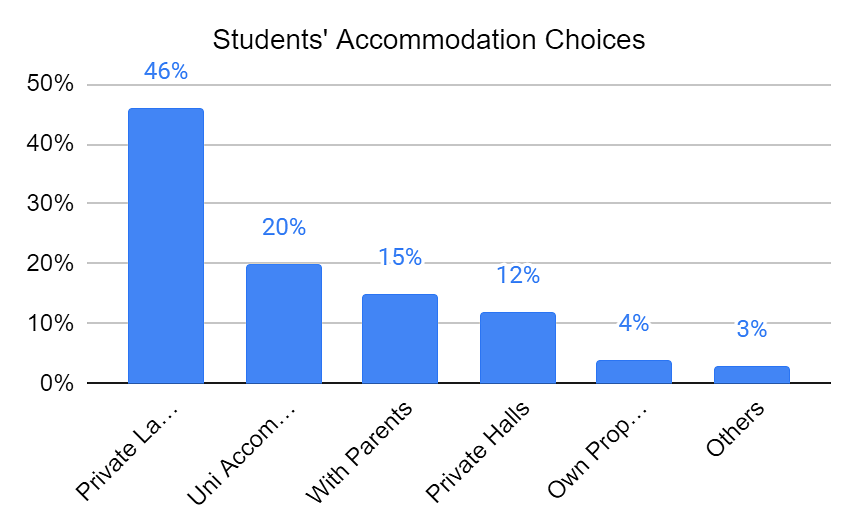
Source: National Student Accommodation Survey 2023
Different Types of Student Rooms
As with types of accommodation for students, there are also 7 different types of rooms.
1. Studios
If privacy is one of your top concerns, studios might be the best option for you. Studios will include a multi-purpose living space that can be either single or dual occupancy, an attached bathroom and a kitchen.
2. Ensuites
Perfect for students who like their privacy but still enjoy socialising, an ensuite is equipped with a private bedroom space with an attached private bathroom. The kitchen and living space are shared among residents.
3. Non-ensuites
A budget-friendly option for students, a non-ensuite is equipped with a bedroom that can be either single or dual occupancy. The residents will share the bathroom, kitchen and living spaces.
4. Shared Apartments
This is a great option for students who enjoy community living. In shared student accommodations, you'll live with two or more fellow students, sharing spaces like the kitchen, bathroom, and living area. This is a great way to make friends for a long time.
5. Twin sharing
A twin-sharing room refers to an accommodation option where two individuals share the same room but have separate beds. This means that the room is equipped with two single beds to accommodate each student separately.
6. Cluster Rooms
Cluster Rooms refer to a type of accommodation arrangement where multiple private living units, typically bedrooms, are clustered around shared communal spaces. This setup is designed to promote social interaction and community living among the students.
7. Student Dorms
Student dorms are buildings that primarily provide sleeping and residential quarters for large numbers of students. These facilities provide communal living spaces for students studying at colleges and universities as a substitute for on-campus living or other types of student housing.
Factors To Consider Before Choosing Student Accommodation

When you start college, there are a lot of different emotions that come with it. One of those emotions is the stress of finding the right place to live as a student. But with so many options to choose from in terms of size and style, it can be difficult to know which one is right for you. Do you want a place closer to campus or one with the features you're looking for? Don't worry, there are a few things you need to consider before you make your decision. So, if you want to get the most out of student housing and make your academic life better, read the information below.
1. Value for Money
As a student who doesn’t have a full-time job, you don’t have much extra income. That's why you need to think about how much your housing will cost. Before choosing student accommodation, you need to figure out how much you can afford and how much do you want to spend each month on rent. This will be a big factor in deciding what kind of place you want to stay. Generally, sharing with other people is the cheapest option. However, if you can pay more, privacy can be on top priority.
Moreover, when choosing student accommodation, an important thing when moving abroad is to estimate the cost of living in the area where your accommodation will be located. Check out these guides for more details on the cost of living in Glasgow, Oxford, Bristol, Liverpool, Birmingham, Manchester, Dublin, and London.
Among students in the National Student Accommodation Survey 2023, those renting from private landlords said that they were paying, on average, less each month than those renting from university-affiliated halls. When choosing student accommodation, you can check our website for a cost-effective room in your desired location, which will not hamper your pocket.
Accommodation type with Average Monthly Rent
Source: National Student Accommodation Survey 2023
- Private Landlord: £523
- Uni Accommodation: £592
- Private Halls: £596
2. Proximity to the University
One of the most important things to look for when choosing student accommodation is the off-campus student accommodation’s location. Firstly, the student accommodation must be located close to your university so that you can make it to your classes on time without hurrying. Make sure to check the distance from the university when booking student accommodation. Furthermore, before booking student accommodation, check the transportation service near your accommodation to the university and also figure out the estimated travel time.
3. Location
Considering the accommodation near to the university is important. However, it is also important to consider essential conveniences such as grocery stores, restaurants, medical stores, public transportation and ATMs. Don’t be afraid to be nit-picky when choosing student accommodation, as the student accommodation option that survives your choosy demands will ensure you feel comfortable living there.
4. Safety
One of the most important things to consider when choosing student accommodation is safety. Look for areas that are safe to live in and buildings that have security features like security cameras or gates. Do your research and get feedback from people who live in the area to make sure everything is safe.
5. Amenities
Today, students prefer accommodation which has more amenities as they are more conscious towards their health. Make sure when choosing student accommodation you check out the amenities that come with the place, like laundry, internet, a gym, and a pool. A place with adequate amenities will make your stay worth it and also contribute to taking an interest in your studies.

6. Security Deposit
When choosing student accommodation to stay in, it's important to make sure you know the security deposit and any other costs that come with it. You don't want to end up with a place you love only to find out it needs a month's worth of security. If you're okay with that, go ahead and book it or look for some other options./
7. Read the Contract
While choosing student accommodation, always sign a contract and go with a reputable letting agency or private landlord. Handshake deals, short-term arrangements, or crashing in a friend's spare room for a few months might seem like a good idea. However, either party has no protection or recourse on the rent, deposit repayments, or other concerns. A good landlord/letting agent will ask for ID, financial statements, guarantors, and a transparent contract agreement. They should also place your deposit into a tenancy deposit protection (TDP) scheme administered by a third party. Carefully read the lease agreement and note the details like the length of the lease, move-in and move-out dates, utilities included, and any additional charges mentioned. Moreover, note the lease breakage fee and the sublease terms should you need to relocate.
8. Extra Perks
When choosing student accommodation, consider that some will only provide minimal amenities, while others will include a few extra facilities in exchange for a somewhat higher monthly rent. It all depends on how essential each of them is to you now. But, in our opinion, healthy food, sufficient ventilation, a clean restroom, and air conditioning (if your destination has extremely hot summers) are essentials. When booking student accommodation with amber, not only are the basic amenities included in the rent, but numerous student accommodation options even offer additional amenities such as gyms and swimming pools.
9. Roommates
When you're living in student housing, it's hard to know what kind of vibe you'll have with your roommates. You can't predict their future, but it's always a good idea to check out the vibe before you move in. Even if you don't get along with everyone, you can still build your friendship over time. A great roommate can be a lifesaver, and a bad one can really ruin your hostel experience. So keep an eye on your roommate when choosing student accommodation.
10. Room Hygiene
While choosing student accommodation, you should prioritise room hygiene. The mould looks and smells gross. It can ruin clothes and furnishings, leaving you with extra expenses. Dampness is also a severe health hazard for people with hay fever, asthma, or other breathing issues. Look out for flaking paint or wallpaper apart from the apparent black mould patches. A musky smell is also a sign of dampness lurking in the walls. When choosing student accommodation, be assured that the room is disinfected. Pest infestations can be a problem in older and cheaper accommodation. Common pest infestations include cockroaches, flies, slugs, mice, pigeons, and, in some cases, rats. Watch out for droppings, slug trails, or pest traps during the viewing. Don't be embarrassed to look inside cupboards; pay particular attention to kitchen surfaces and bin areas. Rustling noises from the attic mean you might share your new house with a family of pigeons.
When it comes to the properties in which students live, these are some of the problems students reported in the survey:
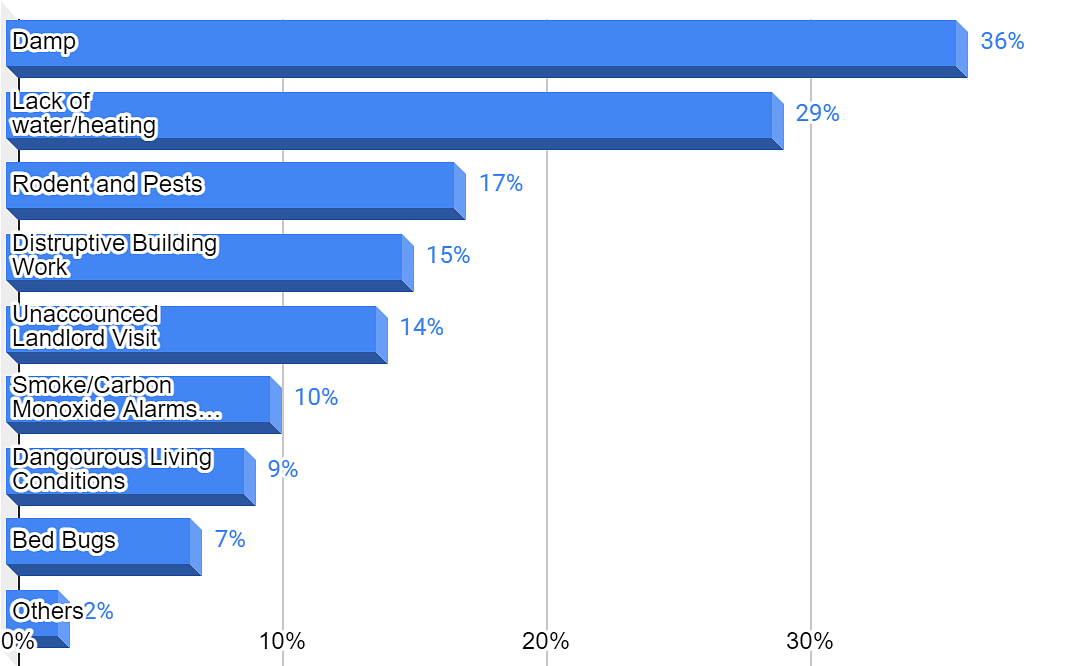
Source: National Student Accommodation Survey 2023
Tips for Choosing Student Accommodation
If you are planning to leave your country to pursue higher education and explore new opportunities in top-tier universities, a student’s housing requirements are a top priority. Below are some tips for when choosing student accommodation to look for if you are looking for the ideal foundation for your college education.
1. Be Careful while Choosing Your Accommodation
The student accommodation market is a big business. Students spend over $4 billion yearly on rental costs in the UK alone. Many landlords and agencies compete for a slice of the pie. They often include 'freebies' or other incentives for students to sign on the dotted line. They might offer a free WiFi package or reduced summer rent. Some will even buy free TVs, game consoles, or shopping vouchers. These might sound like great deals on paper. However, landlords add the cost of your 'free' items to the annual rent in most cases. So keep in mind these things before booking student accommodation.
In the National Student Accommodation Survey 2023, students were asked what their rent included. More than two-thirds (69%) of students in the survey reported that their rent included at least one of the below items.
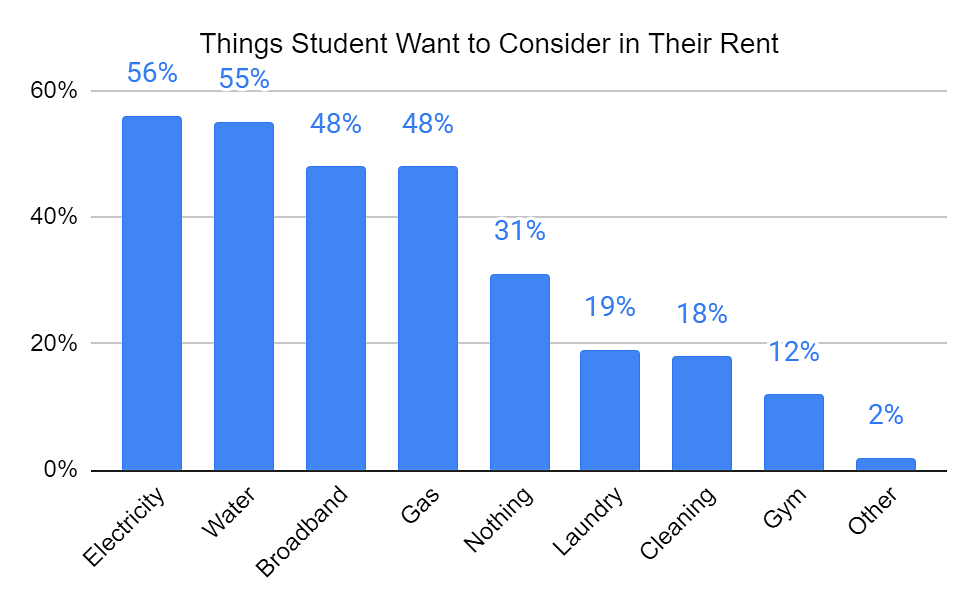
2. Prepare a Checklist
When choosing student accommodation, it's easy to forget questions during a viewing. That's why it's a positive idea to list all your questions and queries beforehand. Aside from the obvious questions about rent, here are a few more things you might want to know before booking student accommodation.
- Is there an Energy Performance Certificate?
- Is there a Gas Safety Certificate?
- What bills are included in rent?
- Is there a parking space?
- Is there an inventory list?
- What deposit scheme is used?
- What are the tenants' responsibilities?
- Is there any discount on summer rent?
- Who were the previous tenants? Why did they move out?
- Is there a discount for paying the rent upfront?
- Are all the furnishings included?
- Are there any additional fees or charges for renting?
Wrapping up
Lastly, beware of rental scams and never make the mistake of sending money for accommodation before meeting the owner in person or before seeing the apartment. Regardless of whichever student accommodation option you choose, be sure it is a comfortable and safe place and be welcoming of the roommates you come across to make your study and stay abroad a success. Make sure to check out our guide to Things You Need to Know as an Off-Campus Student. The wrong accommodation won't necessarily make or break your university experience. Still, your home can significantly impact your studies, social life, and physical and mental well-being. So before choosing student accommodation, do as much research as possible before making your final decision, but do not stress much and know that you can always relocate. Take it as a learning experience!
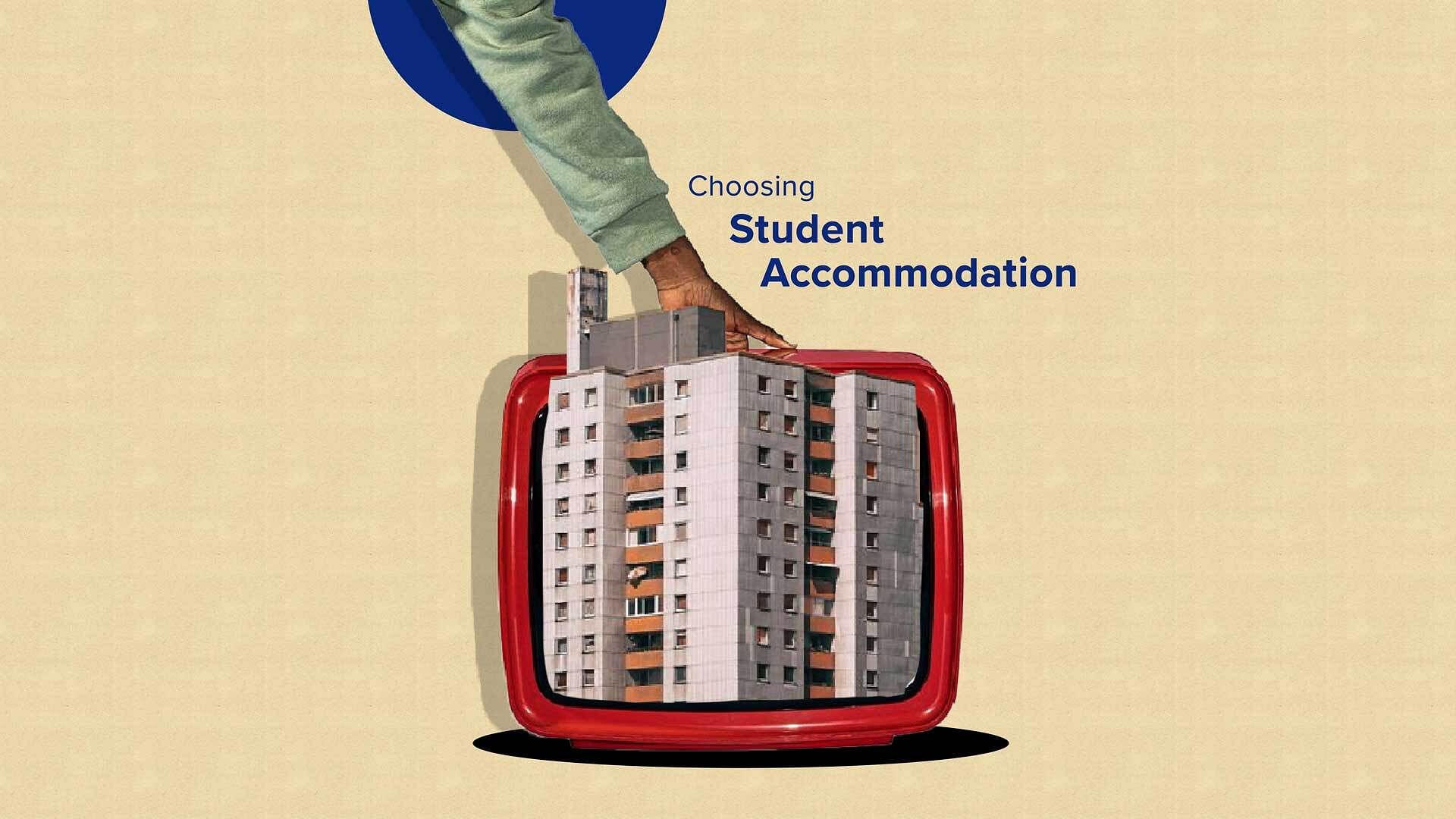


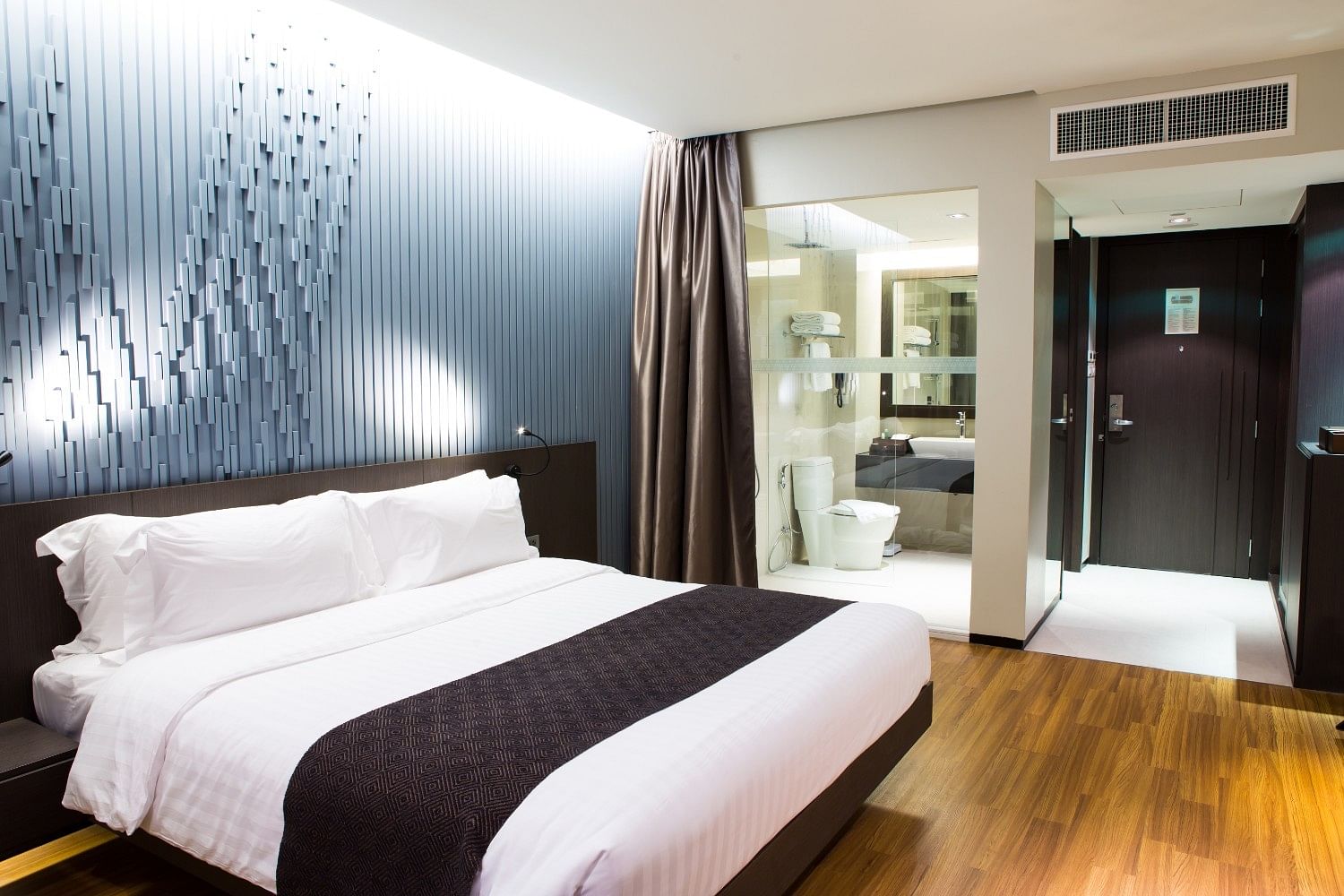

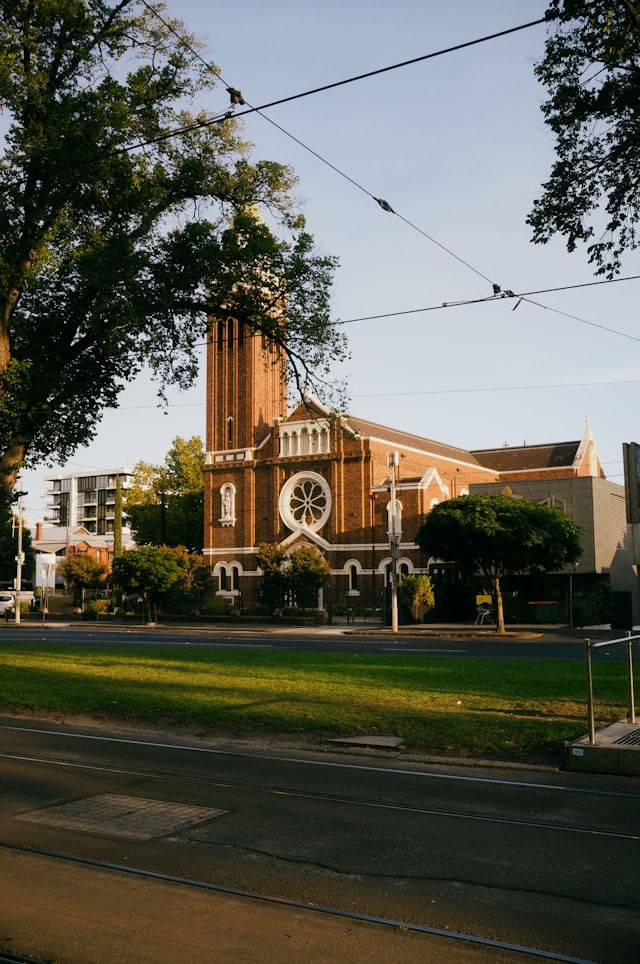
.jpg)
